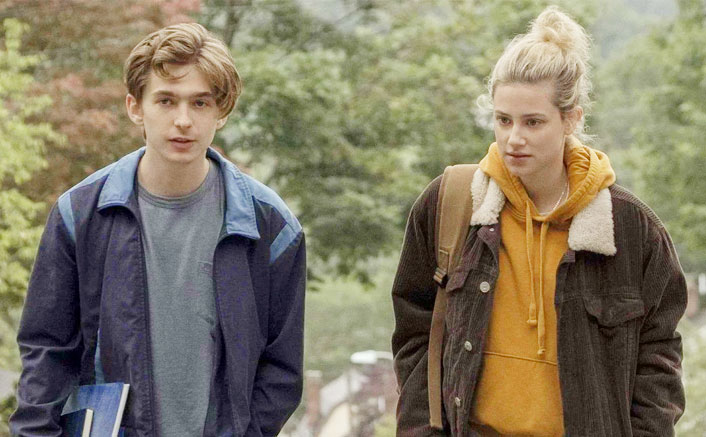Chemical Hearts: The Complexities and Cruel Reality of Growing Up
A review of Amazons’s romantic drama “Chemical Hearts”
Our teenage years are the most enlivening, yet overwhelming, time in our lives. We start off as starry-eyed aliens with a dire hankering to uncover a sense of belonging and fully exert our independence. But, along the way we are faced with new experiences, feelings, and pressures that inevitably arise with getting older. They come at us headfirst without any word of warning, but we’re expected to know how to be able to handle them. Things that might seem meaningless to someone else might feel calamitously life-changing, and everything is heightened to epic proportions. The romantic drama “Chemical Hearts” directed by Richard Tanne explains just that.
Henry (Austin Abams) is a high school senior gunning to be the editor of his school’s newspaper. When meeting with the principal, he finds a woeful transfer student with a cane named Grace (Lili Reinhart) seated in the chair beside him. Grace and Henry are offered spots as co-editors, but Grace turns the position down much to Henry’s surprise.
Grace’s impenetrable exterior allures Henry to find out more about her, so he follows her every day to a hidden garden where Grace sits in front of a tombstone. Henry learns that Grace was in a car accident that killed her boyfriend and impaired her leg, which diminished any passion she had for writing.

The story is adapted from a young adult novel by Krystal Sutherland and deals with Grace and Henry’s budding relationship that negates the chance to properly blossom due to Grace’s guilt over allowing herself to move on and be happy again. Viewers see the inherent broken nature of being a teenager in today’s society through the visual of Henry’s hobby of kintsukuroi, the Japanese art of mending broken pottery by affixing the pieces with gold, which parallels Grace’s pain from her recent trauma. Grief is depicted in a raw, non-sugar-coated way, something rare for a coming of age story.
Lili Reinhart said, “The impression is that someone who’s grieving is depressed and there’s a gray cloud over them all the time, and adapting this book is a beautiful opportunity to show the fact that you can also have many, many other colors happening in your world when you are grieving. You do have moments of happiness and you have moments that are carefree. It’s a misconception that you can’t feel a million things at once. It’s just a very confusing time, and it’s incredible to look at anyone’s journey through grief or heartache.”
While the tear-jerking film ends on a less than desirable note, there were a few significant points that hit home for any person watching. In one scene, Grace shows Henry the one common factor in all of the books in their English class: the main character contemplates/attempts suicide. Grace explains what it means to be a teenager and all of the pressures we face from our parents, friends, and social media. “ There’s a reason why every single author-from Shakespeare to Salinger- write about young people and can’t avoid the truth: being young is so painful, it’s almost too much to feel.”
She explains to Henry that she has thought about what it would be like to not be here anymore, and passionately states that our problems should be talked about, not avoided. “The teenage years are limbo. You’re stuck between being a kid and an adult, and the world tells you to be mature and express yourself, but the minute that you do, it tells you to shut up.” Grace admits that “Adults are just scarred kids who were lucky enough to make it out of limbo alive.”
The film, unfortunately, echoes what many people are told: young love isn’t meant to last forever, and heartbreak is inevitable. However, it brilliantly depicts the tortuous saga of adolescence in an exaggerated, yet meaningful way that is starkly different from your average boy-meets-girl story. Henry has a troubling time understanding Grace, but it is rare for any teenager to fully understand another on a molecular, or even emotional level, given that we are taught that deeply expressing ourselves means we are dramatic, delusional, or sensitive.

Senior Allison Donnelly ‘21 says, “The movie was very realistic. It took you through the ups and downs of what being a teenager is actually like.”
As we get to our later teenage years, sometimes we become wistful about our childhoods. Our biggest worries were choosing between dinosaur chicken nuggets and mini corn dogs or watching Disney or Nickelodeon. We’re so swarmed by expectations and responsibilities that we would do anything to be relieved of them. While some may argue the movie over-aestheticized teenager’s emotions, I would argue it magnified what every teenager feels at some point or another but doesn’t have the courage to say out loud. Chemical Hearts, though heart-wrenching, leaves viewers with the hope that there is the possibility of light after the pain and what is broken can be mended.
Warning: Mentions of Suicide
Rating: R
Running Time: 1 hour, 33 minutes
Amazon Prime

